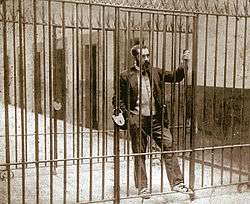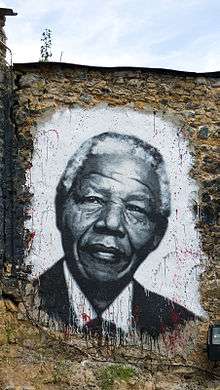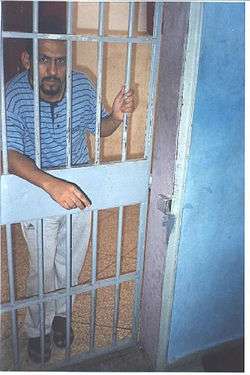Political prisoner



A political prisoner is someone imprisoned because they have opposed or criticized the government responsible.
The term is used by persons or groups challenging the legitimacy of the detention of a prisoner. Supporters of the term define a political prisoner as someone who is imprisoned for his or her participation in political activity. If a political offense was not the official reason for detention, the term would imply that the detention was motivated by the prisoner's politics.
Various definitions
Some understand the term political prisoner narrowly, equating it with the term prisoner of conscience (POC).
Amnesty International
Amnesty International campaigns for the release of prisoners of conscience, which include both political prisoners as well as those imprisoned for their religious or philosophical beliefs. To reduce controversy, and as a matter of principle, the organization's policy applies only to prisoners who have not committed or advocated violence. Thus, there are political prisoners who do not fit the narrower criteria for POCs. The organisation defines the differences as follows:[1]
AI uses the term "political prisoner" broadly. It does not use it, as some others do, to imply that all such prisoners have a special status or should be released. It uses the term only to define a category of prisoners for whom AI demands a fair and prompt trial.
In AI's usage, the term includes any prisoner whose case has a significant political element: whether the motivation of the prisoner's acts, the acts in themselves, or the motivation of the authorities.
"Political" is used by AI to refer to aspects of human relations related to "politics": the mechanisms of society and civil order, the principles, organization, or conduct of government or public affairs, and the relation of all these to questions of language, ethnic origin, sex or religion, status or influence (among other factors).
The category of political prisoners embraces the category of prisoners of conscience, the only prisoners who AI demands should be immediately and unconditionally released, as well as people who resort to criminal violence for a political motive.
In AI's use of the term, here are some examples of political prisoners:
- a person accused or convicted of an ordinary crime carried out for political motives, such as murder or robbery carried out to support the objectives of an opposition group;
- a person accused or convicted of an ordinary crime committed in a political context, such as at a demonstration by a trade union or a peasants' organization;
- a member or suspected member of an armed opposition group who has been charged with treason or "subversion".
Governments often say they have no political prisoners, only prisoners held under the normal criminal law. AI however describes cases like the examples given above as "political" and uses the terms "political trial" and "political imprisonment" when referring to them. But by doing so AI does not oppose the imprisonment, except where it further maintains that the prisoner is a prisoner of conscience, or condemn the trial, except where it concludes that it was unfair.
Parliamentary Assembly of the Council of Europe
The Parliamentary Assembly of the Council of Europe has a much tighter definition:
A person deprived of his or her personal liberty is to be regarded as a 'political prisoner':
- if the detention has been imposed in violation of one of the fundamental guarantees set out in the European Convention on Human Rights and its Protocols, in particular freedom of thought, conscience and religion, freedom of expression and information, freedom of assembly and association;
- if the detention has been imposed for purely political reasons without connection to any offence;
- if, for political motives, the length of the detention or its conditions are clearly out of proportion to the offence the person has been found guilty of or is suspected of;
- if, for political motives, he or she is detained in a discriminatory manner as compared to other persons; or,
- if the detention is the result of proceedings which were clearly unfair and this appears to be connected with political motives of the authorities.[2]
Other definitions
In the parlance of many political movements that utilize armed resistance, guerrilla warfare, and other forms of political violence, a political prisoner includes people who are imprisoned because they are awaiting trial for, or have been convicted of, actions which states they oppose describe as (accurately or otherwise) terrorism. These movements may consider the actions of political prisoners morally justified against some system of governance, may claim innocence, or have varying understandings of what types of violence are morally and ethically justified. For instance, French anarchist groups typically call the former members of Action Directe held in France political prisoners. While the French government deemed Action Directe illegal, the group fashioned itself as an urban guerilla movement, claiming a legitimate armed struggle. In this sense, "political prisoner" can be used to describe any politically active prisoner who is held in custody for a violent action which supporters deem ethically justified.
Some libertarians (such as those who agree with the arguments of Lysander Spooner[3]) also include all convicted for treason and some convicted of espionage in the category of political prisoners. Currently, there is still much controversy and debate around how to define this term and which cases to include or exclude.[4]
Political prisoners can also be imprisoned with no legal veneer by extrajudicial processes. Some political prisoners need not be imprisoned at all. Supporters of Gedhun Choekyi Nyima in the 11th Panchen Lama controversy have called him a "political prisoner", despite the fact that he is not accused of a political offense. He is held under secluded house arrest.[5]
Political prisoners are also arrested and tried with a veneer of legality where false criminal charges, manufactured evidence, and unfair trials (kangaroo courts, show trials) are used to disguise the fact that an individual is a political prisoner. This is common in situations which may otherwise be decried nationally and internationally as a human rights violation or suppression of a political dissident. A political prisoner can also be someone that has been denied bail unfairly, denied parole when it would reasonably have been given to a prisoner charged with a comparable crime, or special powers may be invoked by the judiciary. Particularly in this latter situation, whether an individual is regarded as a political prisoner may depend upon subjective political perspective or interpretation of the evidence.[6]
Notable groups of political prisoners
- In the Soviet Union, dubious psychiatric diagnoses were sometimes used to confine political prisoners in the so-called "psikhushkas".
- In Nazi Germany, "Night and Fog" prisoners were among the first victims of fascist repression.
- In the United States, African-American activists such as the Wilmington Ten (which included Benjamin Chavis), have been wrongfully imprisoned.[7][8]
- In North Korea, entire families are jailed in large political prison camps (called Kwan-li-so) if one family member is suspected of anti-government sentiments.[9]
- Around 1000 British convicts sent to Australia in the 1700-1800s.[10]
- Political prisoners sometimes write memoirs of their experiences and resulting insights. See list of memoirs of political prisoners. Some of these memoirs have become important political texts.
Famous historic political prisoners
- Aung San Suu Kyi led the opposition National League for Democracy which was victorious in 1990 general election. Under jail or house arrest for 15 out of the 21 years from 1990 to 2010.[11]
- Benazir Bhutto was a political prisoner for four years under General Zia ul Haq.[12]
- Carlos Menem, former Argentine president who was a political prisoner under the National Reorganization Process.
- Rubin "Hurricane" Carter, African American boxer wrongfully imprisoned for 19 years in the US due to "an appeal to racism rather than reason"[13][14]
- Antonio Gramsci was a leftist Italian writer and political activist who was jailed and spent 8 years in prison. He was released conditionally due to his health situation and died shortly after.[15]
- Kim Dae Jung served one term (1976–1979) and in 1980 was exiled to the United States, but returned in 1985 and became President of South Korea in 1998.[16]
- Thomas Mapfumo was imprisoned without charges in 1979 by the Rhodesian government in what is now Zimbabwe for his Shona-language music calling for revolution.[17]
- Benigno Aquino Jr. of the Philippines was imprisoned during the martial law regime of Ferdinand Marcos
- Nelson Mandela was imprisoned from 1963 until 1990 in South Africa due to his anti-apartheid activism. He later became the President of South Africa between 1994 and 1999.[18]
- Mahatma Gandhi was imprisoned numerous times by the British both in South Africa and India.
- Eugene Debs, leader of the Socialist Party of the United States, was imprisoned by the US government for his opposition to the First World War.
- Dilma Rousseff current Brazilian president, was imprisoned by the right-wing military government between 1970 and 1973.
- Emma Goldman was imprisoned for two years and then deported by the US government for her opposition to the First World War.[19]
- John Maclean was imprisoned by the British government for his opposition to the First World War.
- Bertrand Russell was imprisoned by the British government for six months for opposing the First World War.[20]
See also
- Prisoner of conscience
- Political prisoners in Azerbaijan
- Political prisoners in Croatia
- Political prisoners in Israel
- Political prisoners in Myanmar
- Political prisoners in Saudi Arabia
- Political prisoners in Syria
References
- ↑ "AI's FOCUS". Amnesty International. Retrieved April 5, 2012.
- ↑ "The definition of political prisoner". Parliamentary Assembly of the Council of Europe. 3 October 2012. Retrieved 2015-11-23.
- ↑ Lysander Spooner, "The Constitution of No Authority," Vols 1,2, and 6. 1867-1870
- ↑ Prof. Tatiana Burudjieva. "Who can be defined as political prisoner". Europost.bg. Retrieved 2013-01-25.
- ↑ "Tibet's missing spiritual guide". BBC News. May 16, 2005. Retrieved May 3, 2010.
- ↑ "The recognition of political prisoners: essential to democratic and national reconciliation process" (PDF). Assistance Association for Political Prisoners (Burma). November 9, 2011. Retrieved August 20, 2012.
- ↑ "Pardons for the Wilmington 10". New York Time SundayReview. December 22, 2012. p. SR10.
- ↑ "The Wilmington 10: North Carolina Urged to Pardon Civil Rights Activists Falsely Jailed 40 Years Ago" Democracy Now, December 28, 2012
- ↑ "The Hidden Gulag – Exposing North Korea's Prison Camps" (PDF). The Committee for Human Rights in North Korea. Retrieved September 21, 2012.
- ↑ "Convicts to Australia". Retrieved August 20, 2012.
- ↑ "Top 10 Political Prisoners". TIME. 2010-08-15. Retrieved 2011-01-01.
Full List FREEDOM FIGHTERS: Aung San Suu Kyi, Nelson Mandela, Mohandas Gandhi, Martin Luther King Jr., Andrei Sakharov, Vaclav Havel, Akbar Ganji, Benigno Aquino Jr., Ho Chi Minh
- ↑ Weaver, Mary Anne (2003). Pakistan: In the Shadow of Jihad and Afghanistan. Macmillan Publishers. p. 73.
Benazir Bhutto... was under house arrest at the time of her father's death; Zia made her a political prisoner for four years
- ↑ Dave D'Alessandro, "'Hurricane' Carter, boxer and NJ native, dies at 76" The Star Ledger (NJ.com), April 20, 2014
- ↑ Selwyn Raab, "Rubin (Hurricane) Carter, Boxer Found Wrongly Convicted, Dies at 76" The New York Times, April 20, 2014
- ↑ Germino, Dante L. (1990). Antonio Gramsci: Architect of a New Politics. Louisiana State University Press. p. 23.
Gramsci carried with him from his Sardinian upbringing two qualities that were to enable him to stand... his long years as a political prisoner in Benito Mussolini's Italy
- ↑ Kim, Jack (2009-08-18). "Former South Korean leader Kim Dae-jung dies". Seoul: Reuters. Retrieved 2011-01-01.
The former political prisoner, once sentenced to death under one of the country's early military rulers whom he relentlessly opposed, was elected South Korea's president in December 1997 on his fourth attempt.
- ↑ "The Struggle Continues". 5 (11). Spin. February 1990.
The chimurenga of Thomas Mapfumo has made him both a pop star and political prisoner in Zimbabwe
- ↑ Boehmer, Elleke (2008). Nelson Mandela: a very short introduction. Oxford: Oxford University Press.
- ↑ Vivian Gornick (2011). Emma Goldman. Yale University Press. ISBN 978-0-300-17761-9.
- ↑ Vellacott, Jo (1980). Bertrand Russell and the Pacifists in the First World War. Brighton: Harvester Press. ISBN 0-85527-454-9.
Further reading
| Wikimedia Commons has media related to Political prisoners. |
- Whitehorn, Laura. (2003). Fighting to Get Them Out. Social Justice, San Francisco; 2003. Vol. 30, Iss. 2; pg. 51.
- n.a. 1973. Political Prisoners in South Vietnam. London: Amnesty International Publications.
- Luz Arce. 2003. The Inferno: A Story of Terror and Survival in Chile. Madison, WI: The University of Wisconsin Press. ISBN 0-299-19554-6
- Stuart Christie. 2004. Granny Made Me An Anarchist: General Franco, The Angry Brigade and Me. London: Simon & Schuster. ISBN 0-7432-5918-1
- Christina Fink. 2001. Living Silence: Burma Under Military Rule. Bangkok: White Lotus Press and London: Zed Press. (See in particular Chapter 8: Prison: 'Life University' ). In Thailand ISBN 974-7534-68-1, elsewhere ISBN 1-85649-925-1 and ISBN 1-85649-926-X
- Marek M. Kaminski. 2004. Games Prisoners Play. Princeton University Press. ISBN 0-691-11721-7 http://webfiles.uci.edu/mkaminsk/www/book.html
- Ben Kiernan. 2002. The Pol Pot Regime: Race, Power, and Genocide in Cambodia under the Khmer Rouge, 1975–1975. Yale University Press. ISBN 0-300-09649-6
- Stephen M. Kohn. 1994. American Political Prisoners. Westport, CT: Praeger. ISBN 0-275-94415-8
- Barbara Olshansky. 2002. Secret Trials and Executions: Military Tribunals and the Threat to Democracy. New York: Seven Stories Press. ISBN 1-58322-537-4